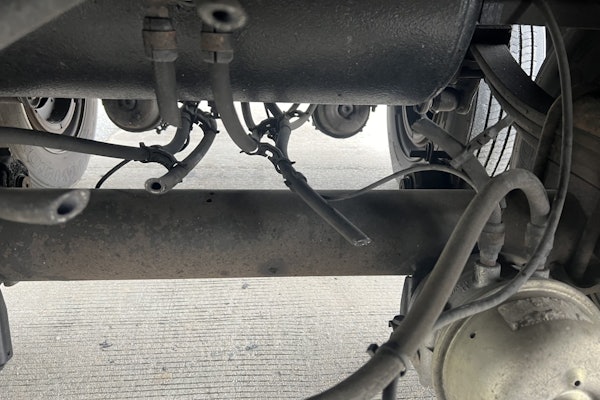April Health Hero
Jack Kelsh
When Jack Kelsh, a trucker from Billings, Mont., was 37 years old, he tipped the scales at 365 pounds. Although he’d always been overweight, the trucking lifestyle he’d been living since 1986 contributed to the unhealthy eating habits he’d adopted over the years. One day, he was in a diet support group and broke the scales in front of the whole class. They had to weigh in at a warehouse loading dock, and that was the first major humiliation. Next, he had to switch to slip-on shoes because he couldn’t bend over far enough to tie his own shoes. Finally, he had to replace his tractor’s steering wheel with a smaller-size wheel in order to fit behind it. “That was the last straw,” Kelsh says. “I knew I had to do something.”
He decided to take charge of his health – to change his diet and start a fitness routine. “I had to start at the beginning. I had to learn how to make better food choices and how to fit exercise into a trucking schedule.”
He cut out sweets and carbs and began developing his own in-cab exercise routine. He lost an amazing 175 pounds in 18 months and dramatically altered his appearance – so much so that his own mother didn’t recognize him at a trim 190 pounds.
Not only did he look and feel better, his health problems (high blood pressure and elevated blood sugar) were solved. Even more incredible, he’s kept the weight off for seven years. Now 44 years old, the company driver says he’s never going back to the way he was. “I’m half the man I was,” he says.
Because he knows firsthand the heartbreak of being obese, Kelsh has dedicated himself to helping obese truckers make the lifestyle change they need to lose weight. He wrote a book with his diet and fitness tips called Nineteen Wheels and began marketing exercise routines and equipment from his website: www.safetythruwellness.com.
Personal: Kelsh, age 44, drives for Diversified Transfer & Storage in Billings, Mont. He has four children ranging in age from 15 to 24. Dog: Kadee
Fitness history: At age 39, I was 6’1″, weighed 365 pounds and wore a size 46 pants. Today, I weigh between 185 and 190 pounds.
What was the biggest challenge? To stop eating when I got full. I used to eat to get my money’s worth. I had to change everything, including how I looked at food. I was a true food addict.
How has your health improved? I have much less fatigue and am a safer driver since I’m more alert. My blood pressure is normal, last time 127/72 compared to when I was obese and it ran 190/100. I also sleep better and never get sick. My mental health also improved, especially my self esteem. I can look people in the eye and be accepted for who I am.
Favorite quote: Ever noticed that the first four letters in health are heal? Disease cannot live in a healthy body.
What do you say to the person who feels hopeless about their health? There is always something you can do to start improving your health. It takes effort and internal motivation. But if I can do it, so can even the most obese trucker. Get started and as soon as you see results, keep on going!
What kind of diet tips do you give? I like to carry bags of dry-pop popcorn and mixed nuts for snacks. I flavor the popcorn with a blend of olive oil and canola oil and use a small dash of sea salt. I don’t order anything fried or processed. Try six small meals a day instead of one or two giant ones. I choose broiled or grilled meat from the buffet.
How do you fit in an exercise program? I bike with a purpose by riding my bike to the store or to the mall. But when I’m the road, I use the exercise program I developed. It’s called the Driver’s Seat Workout and it’s a total body resistance training program you can do in the cab.
Nominate Health Heroes
Do you know any truckers who have worked hard to become more healthy? Maybe they’ve quit smoking, started an exercise program, controlled their sleep apnea or changed their eating habits. E-mail [email protected] or send to Truckers News Fit for the Road, 3200 Rice Mine Rd. NE, Tuscaloosa, AL 35406.
Ask the Experts
Health Question of the Month:
I am having trouble staying awake while driving. I’m 50 pounds overweight and am always tired. My wife says I snore all night.
What can I do to get more energy?
– Robert from Reno
Pam Whitfield is a Chicago-based registered dietician.
You should talk to your doctor about sleep apnea. From a nutrition perspective, obesity is a leading risk factor for sleep apnea. You need to lose some of that excess weight by changing your eating habits. Eat three moderately-sized meals each day. Not one, not two, but three healthy meals with a variety of foods.
When the day is done, watch that heavy meal within 4 hours of bedtime. Your stomach will still be digesting dinner while you’re rolling back and forth in bed. Not a good feeling when you’re trying to log some quality snooze time.
For quick energy out on the road, avoid soda pop and candy bars. A quick sugar fix may seem to be the answer, but the sugar crash when you burn out is not worth the boost. Snack on some walnuts, almonds or peanuts. Or have a PB&J sandwich on whole grain bread.
Dodge caffeine six to eight hours before you go to bed. Coffee, energy supplements and many soft drinks will disrupt your sleep. And if you think that a shot of alcohol will help you sleep, think again. Alcohol may “knock you out,” but it will cause you to wake up in a couple of hours, another doze buster.
Healthier eating habits will lead to better weight control, and before you know it you’ll be sleeping like a baby. And with that, you’ll be in a better mood, have fewer headaches and a whole lot more get-up-and-go.
Aim to drop a steady 1-2 pounds per week.
Ronald Rush, M.D., is a family care physician with Highway Health Care and clinical director of MedXpress Health Care in Texarkana, Texas.
There are many causes of daytime fatigue. Your question, however, suggests a potentially more serious problem called sleep apnea.
This is a medical condition that can lead to very serious health problems. There are many signs that suggest a diagnosis of sleep apnea: obesity, large neck size, snoring, restless legs, daytime fatigue, trouble staying awake, irritability, high blood pressure, diabetes and congestive heart failure, to name a few. Sleep apnea occurs when a person enters the deeper, more restful stages of sleep. As the person relaxes, the breathing becomes shallow and stops for periods up to a minute or more. This sets off alarms and causes the body to wake itself. Frequently, the person is totally unaware that this is happening. This cycle may repeat itself hundreds of times in a night of broken sleep. The consequence is that the person never completes the stages of deep and restful sleep. The resulting stress on the body leads to excessive daytime sleepiness and multiple health problems.
It is important to get this diagnosed and treated. I urge you to talk to your family physician to arrange a sleep study. Any trucker passing through Texarkana, Texas, is welcome to stop by our clinic, tour our sleep lab and pick up more information.
Linda Dunn is a fitness expert from Tuscaloosa, Ala.
The best exercise is to get eight hours of sleep each night! The neurotransmitters in the brain will work optimally if there is enough restorative sleep. The rest and recharging the brain cells get during rest can make a difference in your blood pressure, cholesterol levels and tendency to gain weight around the middle. If you begin to feel drowsy while driving, pull over and stop at a safe place and get out and walk for five or 10 minutes. Bring a jump rope with you and try using it for a few minutes. If jumping bothers your knees or back, try a brisk walk around the rest area.
The walking or jumping rope will get the heart rate up, which will boost your energy levels. Also, be sure to stay hydrated. Drink enough water (not soda) to keep you alert, and your muscles will work better. Stretch the muscles in your legs and back after you walk (hold each muscle group for 30 seconds), and then you should be ready to hit the road. Don’t do strenuous exercise right before bedtime. Instead, try to get your day started with at least 10 minutes of some vigorous movement. Increase your routine by 10 percent per week.
The advice and opinions expressed herein are only general suggestions. Before you undertake any course of action, you should consult your doctor to determine what steps are right for you. Randall-Reilly Publishing, Truckers News and the experts consulted for these articles do not endorse, warrant or promote in any way the products of any of our sponsors.
10 Tips Toward Better Sleep
Source: mayoclinic.com
- Go to bed and get up at about the same time every day, even on the weekends. Sticking to a schedule helps reinforce your body’s sleep-wake cycle and can help you fall asleep better at night.
- Don’t eat or drink large amounts before bedtime. Eat a light dinner about two hours before sleeping. If you’re prone to heartburn, avoid spicy or fatty foods.
- Avoid nicotine, caffeine and alcohol in the evening. These are stimulants that can keep you awake.
- Exercise regularly. Regular physical activity, especially aerobic exercise, can help you fall asleep faster and make your sleep more restful.
- Make your bedroom cool, dark, quiet and comfortable. Adjust the lighting, temperature, humidity and noise level to your preferences. Use blackout curtains, eye covers, earplugs, extra blankets, a fan, a humidifier or other devices to create an environment that suits your needs.
- Sleep primarily at night. If you work nights, keep your window coverings closed so that sunlight, which adjusts the body’s internal clock, doesn’t interrupt your sleep. If
you have a day job and sleep at night, but still have trouble waking up, leave the window coverings open and let the sunlight help wake you up. - Choose a comfortable mattress and pillow.
- Start a relaxing bedtime routine. This may include taking a warm bath or shower, reading a book or listening to soothing music. Relaxing activities done with lowered lights can help ease the transition between wakefulness and sleepiness.
- Go to bed when you’re tired and turn out the lights. If you don’t fall asleep within 15 to 20 minutes, get up and do something else. Go back to bed when you’re tired. Don’t agonize over falling asleep.
- Use sleeping pills only as a last resort. Check with your doctor before taking any sleep medications. If you’re having problems sleeping more than three times a week for a month’s time, see your doctor.
Spotlight on Products
Nineteenth Wheel
Price: $19.95
The Nineteenth Wheel is an ab-roller that helps work the core body muscles. It’s lightweight and durable enough to take with you in the cab.







